现代大学英语精读Book2Unit10 Pompeii 课文原文
【现代大学英语精读2课文原文】大学英语精读2课文原文
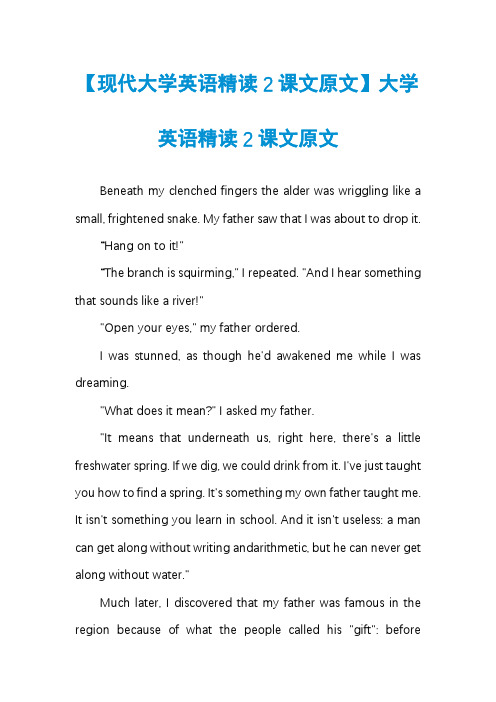
【现代大学英语精读2课文原文】大学英语精读2课文原文Beneath my clenched fingers the alder was wriggling like a small, frightened snake. My father saw that I was about to drop it.“Hang on to it!"“The branch is squirming," I repeated. "And I hear something that sounds like a river!""Open your eyes," my father ordered.I was stunned, as though he'd awakened me while I was dreaming."What does it mean?" I asked my father."It means that underneath us, right here, there's a little freshwater spring. If we dig, we could drink from it. I've just taught you how to find a spring. It's something my own father taught me. It isn't something you learn in school. And it isn't useless: a man can get along without writing andarithmetic, but he can never get along without water."Much later, I discovered that my father was famous in the region because of what the people called his "gift": beforedigging a well they always consulted him; they would watch him prospecting the fields or the hills, eyes closed, hands clenched on the fork of an alder bough. Wherever my father stopped, they marked the ground; there they would dig; and there water would gush forth.Years passed; I went to other schools, saw other countries, I had children, I wrote some books and my poor father is lying in the earth where so many times he had found fresh water.One day someone began to make a film about my village and its inhabitants, from whom I've stolen so many of the stories that I tell. With the film crew we went to see a farmer to capture the image of a sad man: his children didn't want to receive the inheritance he'd spent his whole life preparing for them—the finest farm in the area. While the technicians were getting cameras and microphones ready the farmer put his arm around my shoulders, saying:"I knew your father well.""Ah! I know. Everybody in the village knows each other. No one feels like an outsider.""You know what's under your feet?""Hell?" I asked, laughing."Under your feet there's a well. Before I dug I called in specialists from the Department of Agriculture; they did research, they analyzed shovelfuls of dirt; and they made a report where they said there wasn't any water on my land. With the family, the animals, the crops, I need water. When I saw that those specialists hadn't found any. I thought of your father and I asked him to e over. He didn't want to; I think he was prettyfed up with me because I'd asked those specialists instead of him. But finally came; he went and cut off a little branch, then he walked around for a while with his eyes shut; he stopped, he listened to something we couldn't hear and then he said to me: "Dig right here, there's enough water to get your whole flock drunk and drown your specialist besides." We dug and found water. Fine water that's never heard of pollution.The film people were ready; they called to me to take my place."I'm gonna show you something," said the farmer, keeping me back." You wait right here."He disappeared into a shack which he must have used to store things, then came back with a branch which he held out to me."I never throw nothing away; I kept the alder branch your father cut to find my water. I don't understand, it hasn't dried out."Moved as I touched the branch, kept out of I don't know what sense of piety—and which really wasn't dry—I had the feeling that my father was watching me over my shoulder; I closed my eyes and, standing above the spring my father had discovered, I waited for the branch to writhe, I hoped the sound of gushing water would rise to my ears.The alder stayed motionless in my hands and the water beneath the earth refused to sing.Somewhere along the roads I'd taken since the village of my childhood I had forgotten my father's knowledge."Don't feel sorry," said the man, thinking no doubt of his farm and his childhood; "nowadays fathers can't pass on anything to the next generation."And he took the alder branch from my hands.桤木树枝在我紧握的手指下扭动,如受惊的蛇一般。
现代大学英语第二册Unit_10_Pompeii_2(1)
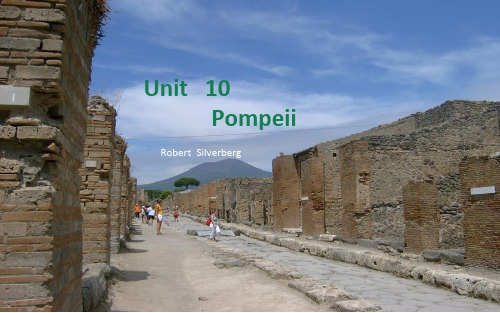
分词作状语时可分为以下几种形式:
* doing : 用来表示主动,且前后动作同时进行。 Returning home later, my friend learned that the police had been to the flat.
* having done: 用来表示主动,且动作发生在主句之前。 Having seen the film before, I decided not to see it again. * being done: 用来表示被动,且前后动作同时进行。 Being questioned by the police, he felt frightened.
I.
List:
Words
• • • • • • 1.mighty 2.overwhelm 3.perish 4.poisonous 5.reverberate 6.savage • • • • • • 7.shatter 8.shroud 9.stumble 10.topple 11.trample 12.absorb
• a picture tour: the temple of Jupiter
• a picture tour: theater
Today’s Pompeii
General introduction: an ancient Roman town-city, Founded in the 7th century BC, destroyed and buried by the eruption of Mount Vesuvius in AD 79, rediscovered in 1748, well-preserved and looks exactly like it was on its last day, a popular tourist destination now.
现代大学英语精读2第二版课文翻译

UNIT1 又一学年——为了什么?约翰·切阿迪1.给你们讲讲我刚当老师时候的一次失败经历吧。
那是1940年的1月,我从研究生院毕业不久,在堪萨斯城大学开始第一学期的教学工作。
一个瘦高,长得就像顶上有毛的豆角架一样的男学生走进我的课堂,坐下,双臂交叉放在胸前,看着我,好像在说:“好吧,教我一些东西。
”两周后我们开始学习《哈姆雷特》。
三周后他双手叉腰走进我的办公室,“看,”他说,“我来这是学习当药剂师的。
我为什么必须读这个?”由于没有随身带着自己的书,他就指着桌子上放着的我的那本。
2.虽然我是位新老师,我本来可以告诉这个家伙许多事情的。
我本来可以指出,他考入的不是制药技工培训学校而是大学,而且他在毕业时,应该得到一张写有理学学士而不是“合格的磨药工”的学位证书。
这证书会证明他专修过药剂学,但它还能进一步证明他曾经接触过一些人类发展史上产生的思想。
换句话说,他上的不是技能培训学校而是大学,在大学里学生既要得到培训又要接受教育。
3.我本来可以把这些话都告诉他,但是很明显,他不会待很长时间,说了也没用。
4.但是,由于我当时很年轻而且责任感也很强,我尽量把我的意思这样表达出来:“在你的余生中,”我说,“平均每天24小时左右。
谈恋爱时,你会觉得它有点短;失恋时,你会觉得它有点长。
但平均每天24小时会保持不变。
在其余的大约8个小时的时间里,你会处于睡眠状态。
5.“然后在每个工作日8个小时左右的时间里,我希望你会忙于一些有用的事情。
假设你毕业于一所药科大学——或工程大学,法学院,或者其他什么大学——在那8个小时时间里,你将用到你的专业技能。
作为一个药剂师,你要确保氯化物没有和阿斯匹林混在一起;作为一个工程师,你要确保一切都在你的掌控之中;作为一个律师,你要保证你的当事人没有因为你的无能而被处以电刑。
这些都是有用的工作,它们涉及到的技能每个人都必须尊重,而且它们都能给你带来基本的满足。
无论你还干些什么,这些技能都很可能是你养家糊口的本领。
现代大学英语第二版精读2Unit...
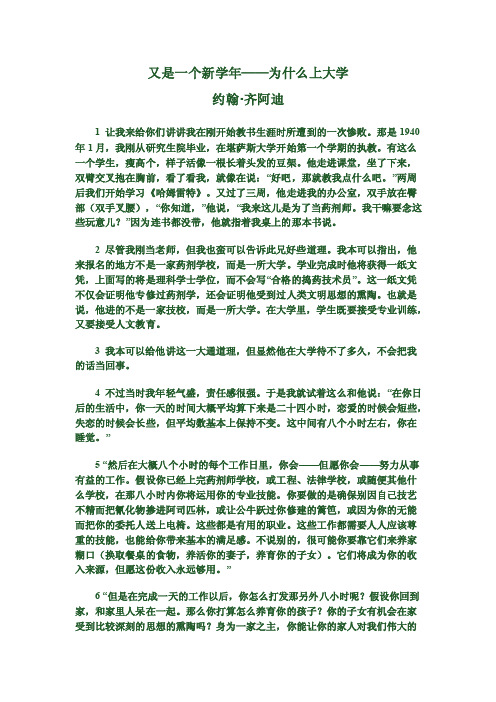
又是一个新学年——为什么上大学约翰·齐阿迪1 让我来给你们讲讲我在刚开始教书生涯时所遭到的一次惨败。
那是1940年1月,我刚从研究生院毕业,在堪萨斯大学开始第一个学期的执教。
有这么一个学生,瘦高个,样子活像一根长着头发的豆架。
他走进课堂,坐了下来,双臂交叉抱在胸前,看了看我,就像在说:“好吧,那就教我点什么吧。
”两周后我们开始学习《哈姆雷特》。
又过了三周,他走进我的办公室,双手放在臀部(双手叉腰),“你知道,”他说,“我来这儿是为了当药剂师。
我干嘛要念这些玩意儿?”因为连书都没带,他就指着我桌上的那本书说。
2 尽管我刚当老师,但我也蛮可以告诉此兄好些道理。
我本可以指出,他来报名的地方不是一家药剂学校,而是一所大学。
学业完成时他将获得一纸文凭,上面写的将是理科学士学位,而不会写“合格的捣药技术员”。
这一纸文凭不仅会证明他专修过药剂学,还会证明他受到过人类文明思想的熏陶。
也就是说,他进的不是一家技校,而是一所大学。
在大学里,学生既要接受专业训练,又要接受人文教育。
3 我本可以给他讲这一大通道理,但显然他在大学待不了多久,不会把我的话当回事。
4 不过当时我年轻气盛,责任感很强。
于是我就试着这么和他说:“在你日后的生活中,你一天的时间大概平均算下来是二十四小时,恋爱的时候会短些,失恋的时候会长些,但平均数基本上保持不变。
这中间有八个小时左右,你在睡觉。
”5 “然后在大概八个小时的每个工作日里,你会——但愿你会——努力从事有益的工作。
假设你已经上完药剂师学校,或工程、法律学校,或随便其他什么学校,在那八小时内你将运用你的专业技能。
你要做的是确保别因自己技艺不精而把氰化物掺进阿司匹林,或让公牛跃过你修建的篱笆,或因为你的无能而把你的委托人送上电椅。
这些都是有用的职业。
这些工作都需要人人应该尊重的技能,也能给你带来基本的满足感。
不说别的,很可能你要靠它们来养家糊口(换取餐桌的食物,养活你的妻子,养育你的子女)。
现代大学英语精读第二版book2unit10
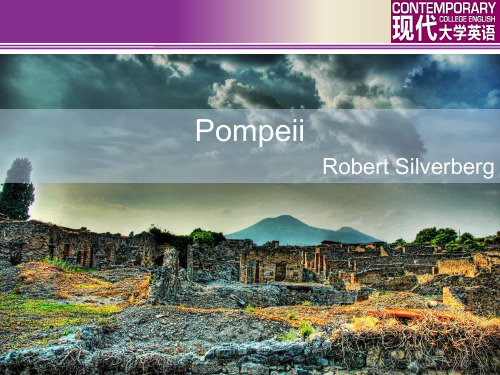
Background
Culture Tips
• The city of Pompeii is a partially buried Roman town-city near modern Naples. Pompeii was partially destroyed and buried under 4 to 6 m (13 to 20 ft) of ash and pumice in the eruption of Mount Vesuvius in AD 79, and it was lost for nearly 1700 years before its accidental rediscovery in 1749. Since then, its excavation has provided an extraordinarily detailed insight into the life of a city during the Pax Romana. Today, this UNESCO World Heritage Site is one of the most popular tourist attractions of Italy, with approximately 2,500,000 visitors every year.
Background
Hale Waihona Puke Culture TipsApollo is one of the most
important and complex Olympian deities in ancient Greek and Roman religion, Greek and Roman mythology. Apollo has been variously recognized as a god of light and the Sun, truth and prophecy, healing, plague, music, poetry, and more. Apollo is the son of Zeus and Leto, and has a twin sister, the chaste huntress Artemis.
现代大学英语精读2 lesson10

6. embrace: n. the act of holding sb. Close to you as a sign of love v. hold closely in the arms as a sign of affection =(accept adopt include grasp comprise etc.) eg: She embraced her son before leaving. embrace an offer, opportunity The term ‘mankind’ embraces men, women and children. 人类一词包括男人,女人和儿童 7.emerge: come up or out into view ; become known or recognized =(appear arise) antonym :submerge n. emergence eg: The moon emerged from behind the clouds. No new evidence emerged during the enquiry. emerge into在…里出现
Introduction to the Text
2. Point of View From Lottie’s point of view. Lottie: all work and no play make a satisfactory life in one’s old age. Bess: Eat, drink and be merry for tomorrow we die.
现代大学英语第二册Unit10Pompeii
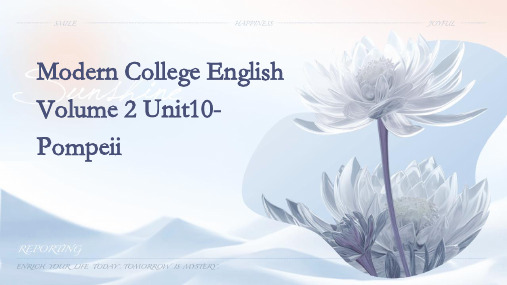
Writing essays helps to develop coherent arguments and evidence-based writing. It involves learning different essay formats and structures, as well as practice in writing different types of essays.
Predicate
The predicate is the part of the sentence that expresses an action or state of being and typically includes a verb.
Modifier
A modifier is a word or phrase that adds descriptive information to the subject or predicate. Adjectives and adverbs are common types of modifiers.
Grammar and punctuation
Essay writing
Writing for different purposes
Writing skills
Developing the ability to listen actively and understand the main points of what is being said is essential for effective communication. This involves asking questions, clarifying points, and paraphrasing to ensure understanding.
最新现代大学英语精读第二册第二版课后翻译以及中文1-8单元

.Unit21 我跟你说,从各方面考虑,当教师不失为一个好主意。
事实上,我认为这个主意好极了。
You know what ?All things considered,it’s not a bad idea to be a teacher. As a matter of fact,I think it is an excellent idea.2我不大喜欢你像刚才那样用讽刺的口气说话。
你好像老是在暗示,我是什么都不会的废物。
I don’t like it when you take a sarcastic tone the way you just did . You seem tobe implying all the time that I am a good-for-nothing.3我爸能让我作最后决定,真是很体谅人。
我得说我够幸运。
不是很多人都有这么好的父亲。
It is really considerate of my father to leave the final decision to me . I must sayI am very lucky.Not many people have such a terrific father.4你说你不要钱。
你可能不愿要,但你的确需要钱。
我看不出来大学生在课余时间挣点钱有什么错。
You said you do not want any money .You may not want money ,but you do need money .I don’t see what’s wrong with students earning some money during their spare time.5不知道为什么,这个曲调听起来很熟,但我就是记不起来了。
反正是一首俄罗斯民歌。
Somehow this tune sounds very familiar, but I can’t recall what it is. In anycase ,It is a Russian folk song.6除了一贯的周末家务,我明天还有一大堆家庭作业要做。
- 1、下载文档前请自行甄别文档内容的完整性,平台不提供额外的编辑、内容补充、找答案等附加服务。
- 2、"仅部分预览"的文档,不可在线预览部分如存在完整性等问题,可反馈申请退款(可完整预览的文档不适用该条件!)。
- 3、如文档侵犯您的权益,请联系客服反馈,我们会尽快为您处理(人工客服工作时间:9:00-18:30)。
Pompeii1 Not very far from Naples, a strange city sleeps under the hot Italian sun. It is the city of Pompeii, and there is no other city quite like it in all the world. Nothing lives in Pompeii except crickets and beetles and lizards, yet every year thousands of people travel from distant countries to visit it.2 Pompeii is a dead city. No one has lived there for nearly two thousand years—not since the summer of the year AD 79, to be exact.3 Until that year Pompeii was a prosperous city of 25,000 people. Nearby was the bay of Naples, an arm of the blue Mediterranean. Rich men came down from wealthy Rome to build seaside villas. Farmlands surrounded Pompeii. Rising behind the city was the 4,000-foot Mount Vesuvius, a grass-covered slope where the shepherds of Pompeii took their goats to graze. Pompeii was a busy city and a happy one.4 It died suddenly, in a terrible rain of fire and ash. The tragedy struck on the 24th of August, AD 79. Mount Vesuvius, which had slept quietly for centuries, erupted with savage violence. Tons of hot ash fell on Pompeii, hiding it from sight. For three days the sun did not break through the clouds of volcanic ash that filled the sky. And when the eruption ended, Pompeii was buried deep. A city had perished.5 Centuries passed…Pompeii was forgotten. Then, seventeen hundred years later, it was discovered again. Beneath the protecting shroud of ash, the city lay intact. Everything was as it had been the day Vesuvius erupted. There were still loaves of bread in the ovens of the bakeries. In the wine shops, the wine jars were in place, and on one counter could be seen a stain where a customer had thrown down his glass and fled.6 To go to Pompeii today is to take a trip backward in time. The old city comes to life all around you. You can almost hear the clatter of horses’ hoofs on the narrow streets, the cries of children and the laughter of the shopkeepers. The sky is cloudlessly blue, with the summer sun high in the sky. The grassy slopes of great Vesuvius rise to the heavens behind the city, and sunlight shimmers on the waters of the bay a thousand yards from the city walls. Ships from every nation are in port and strange languages can be heard in the streets.7 Such was Pompeii on its last day. And so it is today, now that the volcanic ash has been cleared away. A good imagination is all you need to restore it to activity.8 At dawn on August 24, in the year AD 79, Pompeii’s 25,000 people awakened to another hot day in that hot summer. There was going to be a contest in the arena that night and the whole town was looking forward to the bloody fights of the gladiators. The children headed toward school, carrying slates and followed by their dogs, In the forum the town’s important men had gathered after breakfast to read the political signs that had been posted during the night. Elsewhere in the forum the wool merchants talked business. The banker was going over his account books. At the inn late-rising travelers from the East awakened and yawned and called for breakfast.9 The quiet morning moved slowly along. There was nothing very unusual about Pompeii. But tragedy was on its way. Beneath Vesuvius’ vine-covered slopes a mighty force was about to break loose. At one o’clo ck in the afternoon the critical point was reached. The mountain blew up, raining death on thousands. Down in Pompeii, for miles from the summit, a tremendous explosion was heard.10 “What was that?”People cried from one end of town to another. They stared at each other, puzzled, troubled. Were the gods fighting in heaven?11 “Look!” somebody shouted. “Look at Vesuvius!”12 Thousands of eyes turned upward. Thousands of arms pointed. A black cloud was rising from the shattered of the mountain. Higher and higher it rose. Like the trunk of a tree, it rose in the air, branching out as it climbed.13 Minutes passed. The sound of the explosion died away, but it still reverberated in everyone’s ears. The cloud over Vesuvius continued to ris e, black as night, higher and higher. A strange rain began to fall on Pompeii-a rain of stones. The stones were light. They were pumice stones, consisting mostly of air bubbles. These poured down as though there had been a sudden cloudburst. The pumice stones did little damage.14 “What is happening?” Pompeiians asked one another. They rushe d to the temples-the Temple of Jupiter, the Temple of Apollo, the Temple of Isis. Priests tried to calm the citizens. The sky was dark. An hour went by and darkness still shrouded everything. All was confusion. The people of Pompeii now knew that doom was at hand. Their fears were redoubled when atremendous rain of hot ash began to fall. The wooden of some of the houses began to catch fire as the ash reached them. Other buildings were collapsing under the weight of the pumice stones.15 In these first few hours, only the quick-witted managed to escape. A wealthy wool merchant called his family together and crammed jewelry and money into a sack. Lighting a torch, he led his little band out into the nightmare of the streets. Many hundreds of Pompeiians fled in those first few dark hours. Stumbling in the darkness, they made their way to the city gates, then out and down to the harbor. They boarded boats and got away, living to tell the tale of their city’s destruction. Other preferred to remain within the city, huddling inside the temples, or in the public baths or in the cells of their homes. They still hoped the nightmare would end.16 It was evening now. And a trouble was in store for Pompeii. The earth trembled and quaked! Roofs went crashing in ruin, burying hundreds who had hoped to survive the eruption. In the forum the tall columns toppled. The entire city seemed to shake in the grip of a giant fist.17 Three feet of pumice stones now covered the ground. Ash floated in the air. Poisonous gas came drifting from the crater, though people could still breathe. Roofs were collapsing everywhere. The cries of the injured and dying filled the air. Rushing throngs, blinded by the darkness and the smoke, rushed up one street and down the next, trampling the fallen in a crazy fruitless dash toward safety, Dozens of people plunged into dead-end streets and found themselves trapped by crashing buildings. They waited there, too frightened to run further, expecting the end.18 The poison gas thickened as the terrible night advanced. It was possible to protect oneself from the pumice stones but not from the gas, and Pompeiians died by the hundreds. Carbon monoxide gas prevents the body from absorbing oxygen. Victims of carbon monoxide poisoning get sleepier until they lose consciousness, never to regain it. All over Pompeii, people lay down n beds of pumice stones, overwhelmed by the gas, and death came quietly to them.19 All though the endless night, Pompeiians wandered about the streets or crouched in their ruined homes or clustered in the temples to pray. By morning few remained alive. Not once had Vesuvius stopped hurling pumice stones and ash into the air, and the streets of Pompeii were filling quickly. At midday on August 25, exactly twenty-four hours after the beginning ofthe first eruption, a second eruption occurred. A second cloud of ash rose above Vesuvius’summit. The wind blew ash as far as Rome. But most of the new ash descended on Pompeii. 20 The deadly shower of stones and ash went into its second day. But it no longer mattered to Pompeii whether the eruption continued another day or another year. For by midday on August 25, Pompeii was a city of the dead.。
